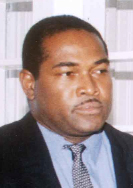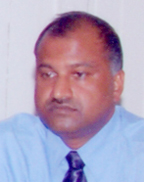– for stiffer drug penalties
The stiff jail sentences recently handed down by Barbados to Guyanese drug traffickers highlight the fact that those found guilty here never get more than five years and PPP MP and attorney Anil Nandlall says the current law must be revamped to permit sterner penalties where warranted.

“I think that in Guyana there need to be a review of the Narcotics Act in terms of penalty, so that the quantum of the narcotics [in the charge] must bear some relationship to the penalty imposed,” Nandlall told Stabroek News in a recent interview.
Drug kingpin Shaheed Roger Khan got 15 years in prison in a US federal court when he pleaded guilty to drug trafficking but closer to home six Guyanese were sentenced to over 400 years in Barbados on drug trafficking charges in that country’s high court.
The six were last week Friday found guilty of possession and trafficking in 91.3 kilos of cannabis and 119.4 kilos of cocaine on November 30, 2005.
Lawmen in that country had testified that they got a tip and started surveillance at a construction site in Rowans Park, St George, Barbados where they saw a container of logs being off-loaded. The logs had been exported from Guyana. They then secretly followed a truck, after some of the logs were loaded onto it, to a house at Bay Gardens, St Michael.
When they raided the house they found two of men unpacking parcels from hollowed-out logs and three women packing those parcels into suitcases. The other defendant, said to be the mastermind, was arrested at a hotel.

The mastermind in this case will serve 30 years in prison while two other persons would serve 25 years with none of the defendants receiving a sentence below 15 years.
‘Commensurate relationship’
Nandlall noted that in Guyana at present if a person is found with 20 grammes of cocaine and another is found with 100,000 kilos of cocaine they can still get the same sentence.
“That I feel needs to be looked at, reviewed, with a view of having a commensurate type of relationship. It must not start with three, it can come down lower. A person with ten grammes or 15 grammes can get a lower sentence; you know — a year, eighteen months as the case maybe,” the lawyer said.
Most of the narcotics cases are tried in the magistrate’s courts and the sentences range from three years to five years.
Nandlall explained that in terms of imprisonment the three to five years penalty is mandatory and as a result when a person is found guilty of trafficking, a magistrate has no power not to impose a custodial sentence ranging between three years to five years imprisonment.
While in Barbados the little over 200 kilos of cocaine and marijuana constituted the biggest

drug bust in the country’s history — hence the stiff penalties imposed, Guyana has had at least one case in just over a decade that involved more than double the amount of narcotics found in Barbados with only a five-year penalty imposed.
That bust occurred 11 years ago when local lawmen with the assistance of the authorities in the USA unearthed some of 6,940 pounds (427.27kilos) of cocaine valued at US$288 million on the MV Danielsen in October 1998.
The St Vincent-registered vessel had travelled from Panama to Guyana and arrived here on October 10, 1998. The cocaine was found on October 22. Local security forces had searched but found nothing and later sought the assistance of the US Coastguard and the DEA. The DEA had sophisticated equipment which found the drugs in the cargo hold.
Captain of the boat, Panamanian Thomas Fortune pleaded guilty and was sentenced to five years in prison and fined $7.6 billion. The seven crew members were deported to the various countries they hailed from. The boat was confiscated to the state and the drug was later dumped in the Atlantic.
Stabroek News attempted ascertain why this and other cases, such as the 2007 fish glue case which involved 106.5 kilos of cocaine, are not tried in the High Court where the defendants could receive life in prison.
This newspaper was told that only Director of Public Prosecutions (DPP) Shalimar Ali-Hack who along with then-DPP Denis Hanoman-singh represented the state in the MV Danielsen case could answer that question. Attempts to contact her proved futile.
‘Smart partnership’
“In a smart partnership with the assistance of their [the US agencies] more sophisticated instrument, the stash of cocaine was eventually found,” Prime Minister Samuel Hinds, who was then Minister of Homes Affairs had said on the MV Danielsen collaboration.
However, there have been no other smart partnerships since and Guyana has come under severe criticism for seemingly ignoring large-scale drug traffickers who are allowed to ply their illegal trade without fear of being caught. It was left up to the US authorities to see persons like Khan, Peter Morgan and former army major David Clarke taken before a court of law for dealing in the illegal drugs.
In an invited comment on the recent Barbados sentencing, Attorney-at-law Nigel Hughes pointed out that the fact that the defendants were charged indictably was an indication of how serious the authorities were about the offence. He said in Guyana the police try people summarily on narcotics cases and these have a maximum penalty of five years. However, he said he could recall that there had been at least two cases where persons were charged indictably in connection with cocaine. One case had seen the Royal Canadian Mounted Police (RCMP) assisting in the investigation and one person had received a life sentence but the decision was later overturned and this apparently frustrated the DPP who withdrew the matter against the other defendants — about eight in number. Hughes said he could vaguely remember another case where the defendant was charged indictably.
‘There are problems’
On the issue of why most of the charges are laid summarily, one legal source posited that the police are sometimes afraid of the jury in such cases.
However, Crime Chief Seelall Persaud said that decision, whether to charge indictably or summarily, is taken by the DPP. And he said there are problems with charging persons with narcotics in the High Court.
“But there are problems. One has to do with time; one has to do with tampering with witnesses, tampering with jury… the High Court is congested… it takes a longer time to get them tried. We have one there since, I think, in the 1990s or early 2000 and something; an airport matter with a former rugby player. He was charged with having 69 kilos or something at the airport. He has been before the court for almost ten years and hasn’t come up for trial. [He is] out on bail,” Seelall told Stabroek News.
Meanwhile, when asked whether Guyana had been involved in anyway in the investigation of the matter in Barbados Seelall had this to say: “I can’t say at this point if Guyana participated in that investigation. I know the Narcotics Branch has worked with several countries and the support they provide sometimes is small; sometimes it’s bigger.”
Seelall, who has worked in narcotics for a significant portion of his career, said he was not at headquarters when the investigation was conducted and “I have not checked whether we did or did not.”
Security observers say that once the six drug convicts were apprehended in Barbados, Guyana should have been able to immediately pick up the trail here and crack down on others in the network. There is no evidence that this occurred.




